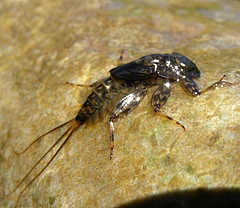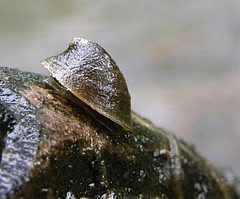02.05.2018 | TOP NEWS, Biodiversity Synthesis, sDiv
30-year river study finds overlooked extinction effect

Net of a caddis fly larva, built for catching prey (photo: Steve Ormerod)

Mayfly larva of the genus Ecdyonurus (photo: Steve Ormerod)

Limpet of the genus Ancylus (photo: Steve Ormerod)
Note for the media: Use of the pictures provided by iDiv is permitted for reports related to this media release only, and under the condition that credit is given to the picture originator.
Not only is the change in their environment causing their numbers to decrease, but once these species become scarce they have limited ability to recolonise their previously occupied habitats. The study not only shows that specialist invertebrates are declining, but it potentially gives an early warning of bigger changes to come.
Professor Steve Ormerod, Cardiff University School of Biosciences, said: “Freshwater ecologists are seriously concerned at the plight of the world’s rivers, lakes and wetlands, and at the rate at which they’re losing plants and animals of many types.
Yet, many people are unaware of this ongoing tragedy hidden beneath the water surface. Our results show that the build-up to species extinction can start in a subtle way, for example, where climate change causes numbers to decline before sudden disappearance.
We’ve already lost one species like this across large areas of Wales, the flatworm Crenobiaalpine, whose specialism is predation in cool-water streams.” Dr Stefano Larsen, former scientist at iDiv/sDiv, now at University of Trento, added: “Species extinction is now a major global issue, but is seen mostly as large-scale changes where whole habitats are lost, invaded by non-native species, polluted or over-exploited.
Local trends have been less clear, particularly from long-term studies at sites like Llyn Brianne, where the absence of serious ecological disruption means that more subtle changes are visible.
Our study shows how species with special ecological needs progressively form a smaller and smaller proportion of the species in our study streams, and there is a risk of them disappearing altogether.” Original publication: Larsen, S. , Chase, J. M., Durance, I. and Ormerod, S. J. (2018), Lifting the veil: richness measurements fail to detect systematic biodiversity change over three decades. Ecology. doi:10.1002/ecy.2213Contact:Prof Jonathan Chase (English)
Head of the research group “Biodiversity Synthesis” at the German Centre for Integrative Biodiversity Research (iDiv) and the Martin Luther University Halle-Wittenberg (MLU)
Tel.: +49 341 9733 120
Web: https://www.idiv.de/en/groups_and_people/employees/details/eshow/chase_jonathan.html
and
Dr Volker Hahn (English, German)
iDiv “Media & Communications”
Tel.: +49 341 9733 154
Web: https://www.idiv.de/en/groups_and_people/central_management/media_and_communications.html
